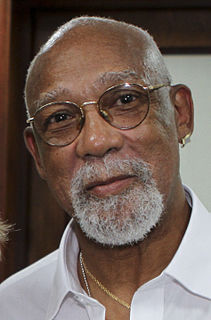A Quote by Mahershala Ali
It's still amazing, but when I was growing up, Harlem was the Mecca of black culture. I was so inspired by it, the aspirational feeling you'd get spending time there. Experiences that were really specific to that place.
Related Quotes
One of the facets of growing up the way I did, I never had the experience of being solely in the black community. Even my family, my mother is what they call Creole, so she's part French, part black, and grew up in Louisiana. It's a very specific kind of blackness that is different than what is traditionally thought of as the black community and black culture. So, I never felt a part of whatever that was.
I was a swimmer growing up, which meant being in the pool at 5 a.m. You get used to it. You get up at 4:15 a.m.; my parents, who were amazing, they were up at 4:15 a.m. or earlier to drop me off at the pool and then go to work. I eventually stopped doing that, but the pattern remained. I like getting up really early. It feels like my time of day.
As a kid growing up and seeing so much strife taking place in society, and particularly on Blacks and people of color, I had an opportunity as a young man to witness the change that was taking place in Harlem, the exodus of white folks leaving Harlem, which I thought was a very cohesive situation. But they felt that they needed to leave.
When I was 17, I worked in a mentoring program in Harlem designed to improve the community. That's when I first gained an appreciation of the Harlem Renaissance, a time when African-Americans rose to prominence in American culture. For the first time, they were taken seriously as artists, musicians, writers, athletes, and as political thinkers.
The influence of the Shaw Brothers films on my work has been profound. In addition to the richness of Asian culture, we at Wu-Tang were fascinated with the struggles between the oppressed Chinese villagers and the repressive Manchu authority and how it mirrored our own experiences growing up as black kids in America's inner cities.
When I was growing up, there was no one. There were very few black women in tech; there were very few black women in the fashion game. We didn't have our Grace Jones - Grace Jones was before my time. We didn't really have a lot of black women in electronic and punk who were celebrated in the same levels as, say, your big mega-superstars.
































